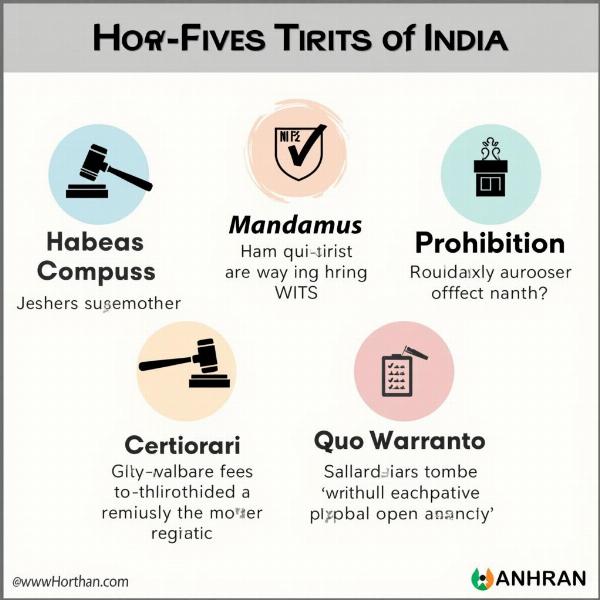Understanding the meaning of writs is crucial for navigating the Indian legal system. “Writs,” in Hindi, are known as “रिट” (rit). They are formal legal documents issued by a court, directing a specific action or prohibiting a certain act. This article explores the meaning of writs in Hindi, their various types, and their significance within the Indian legal framework.
Understanding “रिट” (Rit): A Deeper Dive
The term “रिट” originates from the English word “writ.” It represents a command from a higher authority, specifically the High Court or Supreme Court, to a lower court, government official, or private individual. The essence of a writ lies in its power to enforce fundamental rights and ensure justice. They are vital tools for citizens to seek redressal against unlawful actions.
Types of Writs in the Indian Legal System
The Indian Constitution, under Article 32 and 226, empowers the Supreme Court and High Courts, respectively, to issue writs for the enforcement of fundamental rights. These writs act as safeguards against arbitrary actions and ensure the protection of individual liberties. Several key types of writs are recognized in India:
- Habeas Corpus (बंदी प्रत्यक्षीकरण): This writ, meaning “to have the body,” requires a person under unlawful detention to be brought before the court. It ensures the right to personal liberty and prevents illegal imprisonment.
- Mandamus (परमादेश): This writ compels a public authority to perform a mandatory duty. It ensures accountability and prevents inaction by government officials.
- Prohibition (प्रतिषेध): This writ prevents a lower court or tribunal from exceeding its jurisdiction. It maintains the hierarchical structure of the judiciary and ensures fair trials.
- Certiorari (उत्प्रेषण): This writ is used to quash a decision made by a lower court or tribunal. It is often used to correct errors of law or jurisdiction.
- Quo Warranto (अधिकार प्रप्ति): This writ questions the legitimacy of a person holding a public office. It ensures that public offices are held by qualified and rightfully appointed individuals.
 Different Types of Writs
Different Types of Writs
Significance of Writs: Upholding Justice and Protecting Rights
Writs are essential instruments in upholding the rule of law. They ensure accountability, protect fundamental rights, and provide a mechanism for citizens to challenge unlawful actions. The availability of these writs is a cornerstone of a democratic society, guaranteeing justice and fairness.
What are the grounds for issuing a writ?
A writ can be issued when a fundamental right is violated, or when a public authority acts illegally or exceeds its jurisdiction. The specific grounds for issuing each type of writ vary depending on its purpose.
Who can file a writ petition?
Any person whose fundamental right has been infringed can file a writ petition. This includes individuals, organizations, and even public interest litigation.
Writs in the Context of Constitutional Remedies
Writs in India are considered constitutional remedies because they are specifically provided for in the Constitution. constitutional remedies meaning in hindi This constitutional backing gives them significant weight and ensures their effectiveness in protecting individual liberties. They offer a direct and powerful avenue for citizens to seek justice.
The Role of High Courts in Issuing Writs
High Courts play a crucial role in issuing writs. high court in hindi meaning They act as guardians of fundamental rights at the state level, providing accessible and timely redressal for citizens. The power to issue writs vests significant authority in the High Courts.
Expert Insight:
Dr. Anjali Sharma, a renowned constitutional law expert, states, “Writs are not merely legal procedures; they are the lifeblood of a just society. They empower citizens to hold the powerful accountable and ensure that fundamental rights are not just words on paper but lived realities.”
Justice Rajiv Kumar, a retired High Court judge, adds, “The effectiveness of writs lies in their accessibility. They provide a direct channel for citizens to seek justice without navigating complex bureaucratic hurdles.”
Conclusion
Understanding the meaning of writs in Hindi – “रिट” – is essential for anyone interacting with the Indian legal system. These constitutional remedies are powerful tools for protecting fundamental rights and ensuring justice. From Habeas Corpus to Quo Warranto, each writ serves a distinct purpose in upholding the rule of law. By providing a mechanism for citizens to challenge unlawful actions, writs are crucial for maintaining a just and equitable society.
FAQ
- What is the difference between a writ and a regular lawsuit? Writs are specifically for the enforcement of fundamental rights, while regular lawsuits address a wider range of legal disputes.
- Can a writ be filed directly in the Supreme Court? Yes, under Article 32 of the Indian Constitution.
- What happens if a writ petition is dismissed? The petitioner can appeal to a higher court.
- Are there any fees associated with filing a writ petition? Court fees vary depending on the specific court and the nature of the petition.
- How long does the writ process typically take? The timeline varies depending on the complexity of the case and the court’s workload.
- Can a writ be used to challenge a private individual’s actions? Generally, writs are used against state actors, but they can be applicable in certain situations involving private individuals performing public functions.
- What is the role of a lawyer in a writ petition? A lawyer is crucial for navigating the complexities of writ proceedings and ensuring the effective presentation of the petitioner’s case. meaning of plaintiff in hindi
Meaning-Hindi.in is your premier destination for professional Hindi translation services. We specialize in a wide range of translation solutions, including legal, business, technical, and website localization. Our expert team ensures accurate and culturally sensitive translations to bridge the language gap effectively. Need help with legal document translation or understanding legal terminology in Hindi? Contact us today! Email: [email protected], Phone: +91 11-4502-7584. Meaning-Hindi.in – your trusted partner for all your Hindi translation needs.